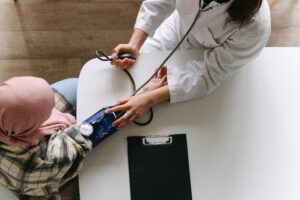Radiofrequency ablation is a minimally invasive treatment option for unsightly, painful varicose veins. You no longer have to have surgery to repair these veins, thanks to innovative radiofrequency technologies like Venefit™.
At HeartCare Associates of Connecticut, LLC, our vein specialists offer in-office radiofrequency ablation procedures to treat damaged veins and improve your blood circulation. We also use the treatment to improve the appearance of your legs without the risk for scarring.
Why you have varicose veins
The veins in your legs have to work hard to send blood back to your heart. The force of gravity makes it more difficult for the blood in your legs to move upwards.
Over time, the valves in your veins can stop functioning correctly, which is a condition known as venous insufficiency. This allows blood to flow backwards and pool in your vein, resulting in twisted, bulging veins that you can see through your skin.
Obesity, pregnancy, smoking, and spending too much time on your feet can also contribute to varicose veins. Also, as you age, your risk for varicose veins increases, especially if you have a family history of the condition.
Consequences of varicose veins
Varicose veins not only affect how your legs look, but they can also cause symptoms that negatively affect your quality of life and your leg health.
Damaged veins can cause symptoms in your legs like:
- Pain
- Burning
- Itching
- Aching
- Heaviness
- Skin discoloration
In some cases, varicose veins can cause more serious complications, including ulcers, bleeding, and blood clots (thrombophlebitis).
If you have any of these complications or you’re unhappy with the appearance of your legs because of the enlarged, twisted veins, our team at HeartCare Associates of Connecticut, LLC, can evaluate your veins to determine if you’re a candidate for radiofrequency ablation.
What to expect from radiofrequency ablation
Radiofrequency ablation is a nonsurgical procedure that requires only a local anesthetic or a mild sedative to keep you comfortable.
Using ultrasound technology to ensure the correct placement, our physicians will guide a thin tube (catheter) into the affected vein. Radiofrequency energy moves through the catheter to collapse the varicose vein and seal it off.
Blood in the vein naturally reroutes to nearby healthy veins. Over time, the treated vein is reabsorbed by your body without any additional treatment.
Following your radiofrequency ablation procedure, you can expect to wear compression stockings to improve the blood circulation in your legs and reduce complications like blood clots.
At your follow-up appointment, you will receive an ultrasound of the treated vein to ensure it’s completely closed.
Keeping your leg veins healthy
To prevent a recurrence of varicose veins, our providers can recommend lifestyle changes you should make after your radiofrequency ablation. This may include:
- Maintaining a healthy weight
- Eating a low-salt, high-fiber diet
- Getting daily exercise
- Quitting smoking
If you spend a lot of time on your feet, wear comfortable shoes that provide support, and limit the wearing of high heels. You can also continue wearing compression stockings to improve your circulation.
If you’re interested in finally getting rid of varicose veins, call the HeartCare Associates of Connecticut, LLC, office nearest you to schedule an appointment, or book one online today.







